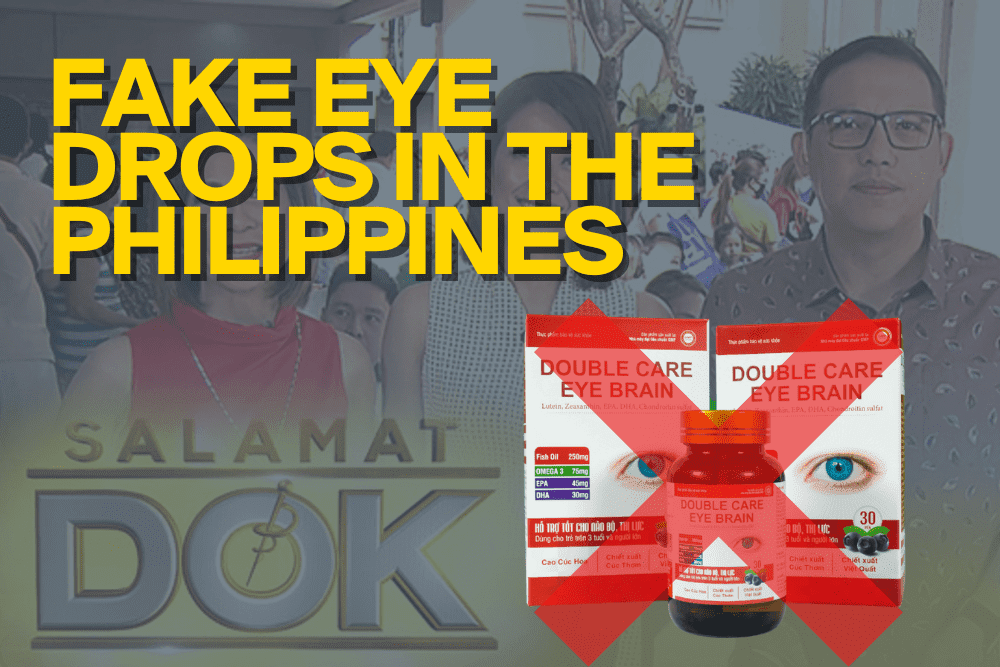A Philippine medical program advertised an eye supplement that claims to heal eye illnesses, but medical experts say otherwise.
A video of the now defunct medical program called “Salamat, Dok” (lit., “Thanks, Doc.) released a segment online that showcases an eye supplement titled ‘Double Care Eye Brain’. It claims to be based on a testimony by a 61-year-old woman.
The segment that was posted on YouTube was viewed 58,000 times. Together with the video, a Facebook post also advertised the eye supplement. The ad stated, “DOUBLE CARE EYE BRAIN — best product of all time — effective after two weeks of use,”
Apparently, some viewers were persuaded by the product’s claimed health advantages and were willing to buy the product. This piqued the attention of experts to verify and check the product’s credibility.
False Claims
In the clip from the television program,, the product’s name was incorporated into the lower right corner of the screen, accompanied by a scrolling ticker text that reads: “Commitment 100% Safety – Effective – FDA Certified” beneath the video. Agence France-Presse (AFP), a wire news agency also investigated and found that the video has been digitally altered.
In addition, the Food and Drug Administration does not approve the product. The product Double Eye Care Brain is not present on FDA’s database and is not registered as a supplement nor a medical product in the Philippines. Medical experts also informed AFP that no nutritional supplement can treat eye conditions effectively without medication or surgery.
The Proper Treatment for Eye Diseases
The advertisement of the said supplement can mislead numerous people due to the life testimony and the wrong claim it presents. There are proper ways to treat eye diseases.
Cataracts can only be addressed through surgery. However, the development of cataracts can be delayed by factors such as quitting smoking, preventing eye injuries, controlling diabetes, avoiding specific medications like steroids, and shielding the eyes from UV rays.
Diabetic retinopathy, an eye condition related to diabetes, is managed by regulating blood sugar and blood pressure levels. Depending on its severity, laser therapy, injections, or surgery can also treat this eye condition.
Prescribed medications are necessary for treating glaucoma (a condition that damages the eye’s nerves) and keratitis (inflammation of the cornea), and these medications cannot be replaced with vitamins.
The treatment for age-related macular degeneration involves options like drug injections into the eye and laser therapy. Mineral supplements are advised for patients with milder cases to slow down disease progression, but they are not intended to reverse the condition.
Doctor’s Reminder
Social media has become a prominent platform for advertising medicines and healthcare products. However, advertising medicines on social media can pose various dangers and risks, both for consumers and pharmaceutical companies.
Atty. Cheryl C. Tamayo, M.D., DPBO, a Pediatrics – Ophthalmologist in Mother Teresa of Calcutta Medical Center, shared some advice on how to avoid counterfeit medicines saying “The best way is to see your doctor because it is important to correlate the symptoms to the medications that you’ll be using,” Self-medication can lead to various risks to one’s health which can lead to an adverse reaction or misdiagnosis.
People may self-medicate or scour the internet for easy remedies for multiple reasons, such as check-ups being costly or due to the lack of access to proper healthcare. Dr. Cheryl states, “There are DOH-accredited eye centres all over the Philippines that are accessible to the public.” It is smart to utilize these services rather than take the risk of using a medication that may be counterfeit. “It is better to regularly see your eye doctor, preferably once a year, and always fact-check with them about news and medications posted on social media,” she added.
As of writing, the website for this supplement is still live.

